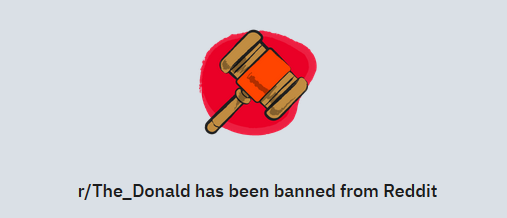Reddit has finally followed through on its months-long threat to ban r/The_Donald subreddit, the largest group on that social media platform in support of President Donald Trump that had boasted over 750,000 followers.
The move comes a year after the group had been “quarantined” by Reddit, preventing the group’s posts from appearing on the front page of the website. Within months users could no longer even post to the group.
Prepared for this ultimate outcome, the group’s moderators took it upon themselves last year to found Thedonald.win, a social website devoted to user-generated content supporting President Trump’s reelection bid in 2020.
In a post on the new website, following the ban, the moderators write, “We refused to let a company run by Winnie The Pooh [i.e. China] have any impact on our message. They censored us, they suppressed us, they silenced us. We beat them. With nothing but raw talent, and a patriotic drive to preserve our country, we escaped Silicon Valley censorship and created a new home out of nothing. No donors, no outside influences, just us and our message. And you came.”
The post continues, “Many doubted that there was a place on the internet for us, that we could maintain this community without being associated with a big website. We knew they were wrong, because we know that this is the greatest community that has ever existed! We are more active, more popular, and more powerful than we ever were…”
Now with thousands of users, Thedonald.win is showing that if you’re tired of being beholden to companies determined to control speech in the U.S. to affect political outcomes, you don’t have to put up with it.
Other companies such as Parler have been marketing towards conservatives with a similar appeal.
And amid a crackdown of conservative content on social media platforms, with users on Facebook, Twitter and Youtube being censored, suspended, banned and demonetized, it’s about time.
In many ways we are living in the “social tyranny” of the majority that John Stuart Mill warned about in his classic, On Liberty.
Mill wrote, “[W]hen society is itself the tyrant — society collectively over the separate individuals who compose it — its means of tyrannising are not restricted to the acts which it may do by the hands of its political functionaries. Society can and does execute its own mandates; and if it issues wrong mandates instead of right, or any mandates at all in things with which it ought not to meddle, it practices a social tyranny more formidable than many kinds of political oppression, since, though not usually upheld by such extreme penalties, it leaves fewer means of escape, penetrating much more deeply into the details of life, and enslaving the soul itself.”
Social media is supposed to be the “marketplace of ideas” that Mill and others championed. But as he foresaw, it would take more than limits on government to protect against censorship. As Mill warned, “Protection, therefore, against the tyranny of the magistrate is not enough; there needs protection also against the tyranny of prevailing opinion and feeling, against the tendency of society to impose, by other means than civil penalties, its own ideas and practices as rules of conduct on those who dissent from them; to fetter the development and, if possible prevent the formation of any individuality not in harmony with its ways, and compel all characters to fashion themselves upon the model of its own.”
Mill added, “There is a limit to the legitimate interference of collective opinion with individual independence; and to find that limit, and maintain it against encroachment, is as indispensable to a good condition of human affairs as protection against political despotism.” The question for Mill and us today is where that limit is and ought to be placed. Mill called it “the principal question of human affairs.”
In an attempt to answer the problem, President Donald Trump in a May 28 executive order is reining in Section 230 of the Communications Decency Act and limiting it to its original scope to allow online media services only to remove certain content the provider “in good faith” finds to be “obscene, lewd, lascivious, filthy, excessively violent, harassing, or otherwise objectionable, whether or not such material is constitutionally protected” in exchange for liability protection.
From the Trump order, “It is the policy of the United States to ensure that, to the maximum extent permissible under the law, this provision is not distorted to provide liability protection for online platforms that — far from acting in ‘good faith’ to remove objectionable content — instead engage in deceptive or pretextual actions (often contrary to their stated terms of service) to stifle viewpoints with which they disagree. Section 230 was not intended to allow a handful of companies to grow into titans controlling vital avenues for our national discourse under the guise of promoting open forums for debate, and then to provide those behemoths blanket immunity when they use their power to censor content and silence viewpoints that they dislike.”
To that end, President Trump is directing the Secretary of Commerce to petition the Federal Communications Commission for regulations that will outline the extent of liability protection under Section 230 and “the conditions under which an action restricting access to or availability of material is not ‘taken in good faith’” under the law.
And in the meantime, while the regulatory process works itself out, Americans can take matters into their own hands and opt out of social media that censors their speech. So, if you think social media companies are abusing federal law to establish one-party rule, you’re under no obligation to participate in it.
Robert Romano is the Vice President of Public Policy at Americans for Limited Government.








